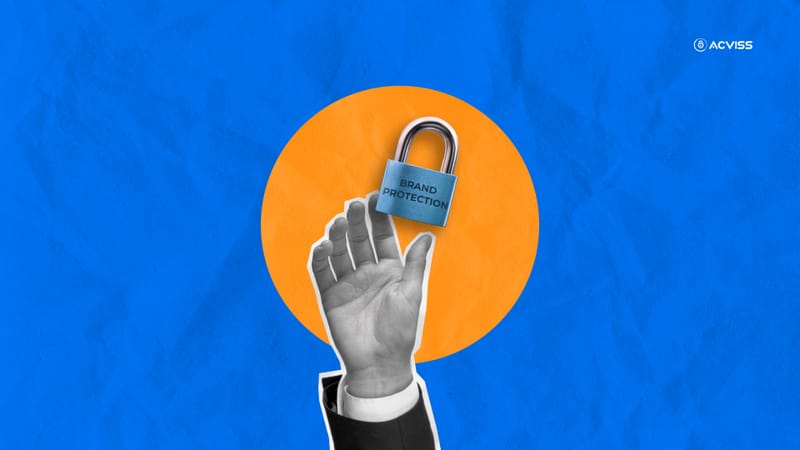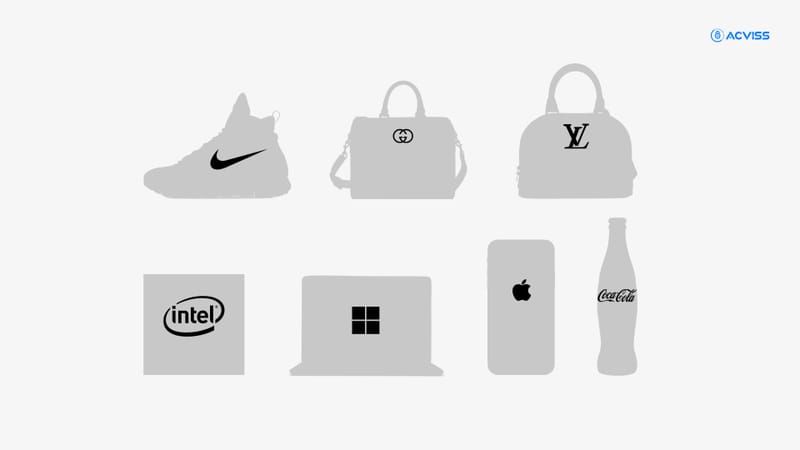7 Brands That Have Implemented Brand Protection Solutions

Your brand extends far beyond its logo and tagline. It is built on customer trust, reputation and the very essence of what the company stands for. However, this valuable asset faces constant threats from counterfeiting, online scams and social media manipulation. This is where brand protection solutions act as a digital shield to safeguard a company's reputation and intellectual property.
Rising Requirement for Brand Protection Solution
Counterfeiting has reached the $4 trillion market in 2023, impacting everything from small-scale businesses to luxury brands.Their threat extends beyond physical counterfeiting.
Social media has become a breeding ground for brand abuse and online marketplaces are plagued by unauthorised resellers and counterfeit marketers, weakening brand control and harming customer experiences. That’s where brand security becomes an essential investment for businesses of all sizes in the digital age.
The Commonly Used Brand Protection Solutions.
The brand protection landscape offers a variety of tools and services to combat different threats. Each brand can choose the best anti-counterfeiting solution suiting their business nature.
- Anti-Counterfeiting Measures: Sophisticated packaging uses unique QR labels that are tamper-evident, along with collaboration with law enforcement agencies to seize counterfeit goods.
- Trademark Monitoring: Brands marketing online can continuously scan digital platforms for unauthorised use of your trademarks, logos and copyrighted material.
- Online Brand Reputation Management: Monitoring social media conversations, addressing negative comments and collaborating with influencers to maintain a positive brand image.
- Product Monitoring Tools: Traceability tools can track products across the supply chain to learn the vulnerabilities and prevent tampering.
- Consumer Education: Spreading awareness among consumers about the dangers of counterfeiting and educating them to identify authentic products.
How Top Companies Utilize Brand Protection Solutions

1. Nike
Nike, the iconic sportswear giant, is considered the most targeted brand in the world. A fake Nike can go between $10 - $200 in the market. Nike has been one of the leaders in brand security for decades, their multi-pronged approach in both offline and online marketplaces includes:
- Online Monitoring: Nike utilises advanced software to scour online marketplaces for counterfeit listings that are swiftly reported and removed.
- Packaging Security Features: The brand incorporates hidden codes or unique textures into its packaging aiding in tracking the movement of genuine products through the supply chain.
- Law Enforcement Collaboration: Nike actively works with law enforcement agencies around the world to identify and dismantle large-scale counterfeiting operations.
2. Louis Vuitton
Counterfeiters always have a sweet spot for luxury products. Louis Vuitton, the luxury fashion brand has always been a hot target for fraudsters. They lose almost $1 billion annually to counterfeiting and grey market trade, pressuring them to employ a vigorous brand protection strategy to stay firm in the market.
- Intricate Holograms: Louis Vuitton implemented holograms with details that are difficult and expensive to replicate acting as multiple layers of authentication for consumers.
- Track-and-Trace Technology: Track-and-trace technology is embedded within their products allowing the brand to monitor the movement of products throughout the supply chain.
- Customs Cooperation: Louis Vuitton collaborates with customs officials across the globe to intercept counterfeit shipments before they reach consumers.
3. The Coca-Cola Company
Coca-Cola, the world's most recognizable brand, is also the most counterfeited beverage in the market. Ever since its introduction, Coca-Cola has garnered a wide audience which in turn created an open market for counterfeiters to make some quick buck. However, Coca-Cola has raised the bars of anti-counterfeiting in the last few decades, drastically reducing the fakes using:
- Tamper-evident Packaging: Coca-Cola uses unique closures or seals on their packaging for easier identification by consumers before consumption.
- Security Inks: Hidden codes are incorporated within its packaging using security inks only visible under ultraviolet light.
- Bottler Partnership: The Coca-Cola Company maintains strict quality control standards throughout its vast bottling network safeguarding brand reputation and consumer safety.
4. Microsoft
Microsoft software is one of the most counterfeited and pirated software ever. MS Word, Windows OS and MS Excel are the most commonly counterfeited software. It's important to realise the inherent difficulty in protecting digital products. The intangible nature of software makes it easier to copy and distribute illegally compared to physical goods.
- Product Activation Codes: Microsoft software products often come with activation codes that need to be linked to an online account during installation. This process helps deter casual piracy, as it requires additional steps compared to simply installing a counterfeit program.
- Online Verification Tools: Microsoft allows users to confirm the legitimacy of their software using various tools helping deter pirated software copies and ensure users have genuine products.
Check out how online brand protection tools can help your brand secure your digital front.
5. Gucci
Gucci, the Italian luxury fashion house, is a prime target for counterfeiters. Over 800,000 searches have been made on the internet for fake Gucci products every year. From handbags and sunglasses to apparel and footwear, Gucci products are replicated and sold on the black market at an alarming rate. To combat this issue, Gucci has implemented different methods of security.
- Microscopic Holograms: Gucci specialises in using holograms only visible under magnification that is difficult and expensive and harder to replicate.
- Unique Serial Numbers: Each genuine Gucci product has a unique serial number ingrained in a discreet location enabling tracking and identification.
6. Intel
Intel, the world's leading chipmaker renowned for its processing power and innovation attracts a swarm of counterfeiters. The counterfeit chip market has exceeded the $75 billion mark globally in Intel leads the list. From CPUs and motherboards to the very name "Intel," these imitators plague the black market. To combat this threat, Intel wields a comprehensive brand protection strategy.
- Laser Etching: Intel’s laser etching to embed unique identifiers directly onto their processors makes it difficult for counterfeiters to replicate genuine chips, as the etching process is highly specialized and expensive.
- Security Seals: Intel utilizes tamper-evident packaging with security seals. This deters tampering and allows consumers and retailers to identify potentially compromised products.
7. Apple
Apple, the tech innovator, is the most counterfeited tech brand in the world. From Airpods, iPhones and Macbooks, they have a huge demand in the fake market. To counter Apple employs different brand security strategies. The effectiveness of Apple's strategy lies in its comprehensive approach.
- Unique Serial Numbers: Every Apple product comes with a unique serial number. This number allows for individual product tracking and identification, aiding in authentication and helping to trace the origin of counterfeits.
- Software Authentication: Apple software products have built-in authentication features including Apple subscriptions and warranty checks that verify the legitimacy of the software during installation.
Beyond the Big Names: Brand Safety for Businesses of All Sizes
Yes, the above examples show how leading companies use brand protection solutions to safeguard their brands, but it’s important to understand that these strategies are relevant for businesses of all sizes. Why:
- The Democratization of Anti-Counterfeiting Tools: The availability of affordable and user-friendly security solutions has made it easier for smaller businesses to implement these safeguards. We, at Acviss have been able to secure brands of varying scale, nature and industry.
- The Power of Online Space: Similar to your physical shop, your digital front demands equal protection. Implementing an online brand monitoring solution with Acviss will provide 360 security for your brand.
- The Importance of Intellectual Property: Whether it's a unique logo or a groundbreaking invention, protecting intellectual property is crucial for any business, regardless of size.
Here’s everything you need to know about IP
How to Check Brand Protection Solution?
Brand security is not an easy feat. It takes a tremendous amount of effort, time and money. While such investments are made, it is necessary to check if the solutions meet your brand requirements. Here are 4 factors you should check in your brand protection tools before implementation.
1. Integration into existing system
Implementing the new solution to your supply chain requires assistance. This will amount to a huge time in training exercises for your team. Choose tools that can easily integrate with your existing erp system. Thus, reducing the cost and time required.
2. Growth
Your brand is subjected to growth, often expanding outside national boundaries. Ensure the solution provider has the resources to meet your rising demand. The solution should be scalable, along with the brand.
3. Returns
Understand the ROI of the brand protection services available. While investing in such a solution, make sure they don't go wasted. An experienced anti-counterfeit solution provider will present you with a clear idea of the solution required for your problem and the returns you will attain.
4. Reach
Understand where your threats are coming from? While choosing the solution, make sure it covers the channels and platforms you are present in. Opt for providers who can secure your online and offline presence. Anti-counterfeit solutions that can protect you in the digital and physical market will be a major advantage in the future
Key Takeaways
- Brand Protection is Essential: With the global counterfeiting market reaching trillions, safeguarding brand identity is crucial for both small businesses and industry giants. Effective brand protection helps maintain customer trust and secures your brand’s reputation.
- Common Threats Faced by Brands: From counterfeit products and unauthorized resellers to digital impersonation on social media, brands face threats on multiple fronts that can damage reputation and erode customer loyalty.
- Practical Solutions for Brand Security: Brands are employing solutions like anti-counterfeiting technologies, unique packaging, online brand monitoring, and consumer education to protect their assets in the digital age.
Acviss Case Studies
Case Study 1: Enhanced Brand Monitoring for Consumer Safety
A beauty brand faced challenges with counterfeit products appearing on popular e-commerce platforms. Acviss implemented a QR code solution that allows consumers to instantly verify authenticity via their smartphones. This helped customers avoid fake products, significantly boosted brand loyalty, and provided the brand with data on counterfeit trends.Case Study 2: Real-time Online Monitoring for Digital Presence
A consumer electronics company noticed their brand name was being misused on several fake websites. Acviss deployed its AI-driven monitoring solution, Truviss, to detect and remove counterfeit listings and fraudulent websites. This proactive approach helped the brand safeguard its online reputation and build trust with consumers.
As technology continues to evolve, so will the tactics employed by counterfeiters. Your brand needs to adopt strategies to stay ahead of the curve. Collaborating with brand protection partners can take your game a step further. Your brand and your customers should not fail because of inefficiency.
Acviss, alongside other leading solutions, offers powerful tools to protect your brand’s reputation. Reach out for a demo to see how Acviss can strengthen your brand protection strategy and ensure trust in your brand across physical and digital channels.